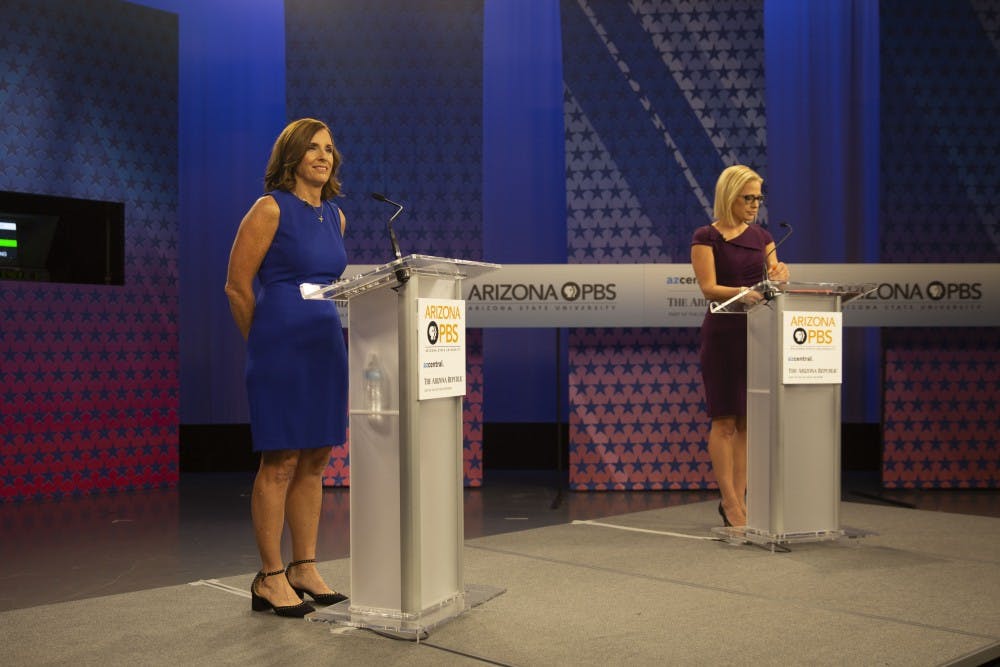U.S. Representatives Martha McSally and Kyrsten Sinema found more common ground than one would expect when they went toe-to-toe in the only live televised debate for the Arizona senate race, with Sinema flexing her bipartisan bonafides.
The debate, which was broadcast live on Arizona PBS on October 15, focused on healthcare, immigration, border security and the economy.
Incumbent Republican Sen. Jeff Flake announced last year that he would not seek re-election. The race pits Sinema, an ASU lecturer and Democratic Congresswoman from District 9, against McSally, a Republican congresswoman from District 2 and air force combat veteran.
The debate, while generally civil, escalated in the final minutes with McSally accusing Sinema of treason, claiming that in a 2003 radio interview Sinema said it was OK for Americans to join the Taliban.
Sinema said in response that McSally's campaign was engaging in "ridiculous attacks and (smears)."
Healthcare:
Sinema: Sinema voted against repealing the Affordable Care Act, or Obamacare. She believes, however, that the current healthcare system is “broken and needs to be fixed.” Sinema was also adamant about opposing privatization of the healthcare system and supported Social Security and Medicare for all.
McSally: McSally and Sinema agreed the ACA needs to be fixed. However, McSally voted for it to be repealed when the legislation went to the House. “Obamacare was the wrong approach,” McSally said. She also said that private health insurance will help cut taxes and bring premiums or monthly fees, down.
Immigration and Border Security:
Sinema: Sinema voted for a bill put forth by the Trump administration that allocated billions for the construction of a border wall and for U.S. Immigration and Customs Enforcement. However, she also said she wants that money to go to more than just a wall. “I believe that simply funding for a border wall is not sufficient because the dangers we have around border security are too great to simply allow for an 18th century solution to a 21st century problem,” Sinema said. She also said Deferred Action for Childhood Arrivals recipients deserve a path to citizenship.
McSally: McSally said she supports a strong military and ICE presence on the border and that lax border control in the past has led to the current uncertainty about the fate of the DACA program. “The policies of the past have failed,” McSally said. She said that both candidates agreed stronger border security is a must for Arizona. “I have consistently shown that I was willing to do something on DACA, but we have to secure our border and we have to address the root causes of why we have a DACA population in the first place,” she said.
Read more: DACA students continue to struggle following spring tuition ruling
Economy:
Sinema: Both candidates agreed that the economy was booming. However, Sinema said she voted no on the Tax Cuts and Jobs Act, a sweeping cut that mostly reduced the tax burden for high-earners. “It increased our deficit,” Sinema said. She said she later voted yes on a bill that cut taxes for middle class families and small business owners.
McSally: “I proudly voted to cut the taxes of Arizona’s hard-working families to make sure they have more money in their paychecks,” McSally said. She also the U.S. is at a historically low rate for unemployment. However, she also said that the government has “a spending problem” but in the same sentence also said she fought for an increase in military spending.
Reach the reporter at mlshuman@asu.edu or follow @mackenzieshuman on Twitter.
Like The State Press on Facebook and follow @statepress on Twitter.




